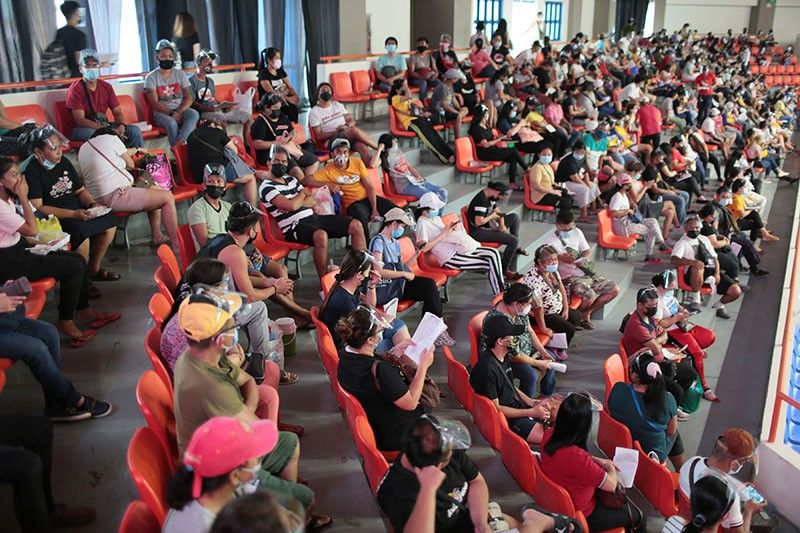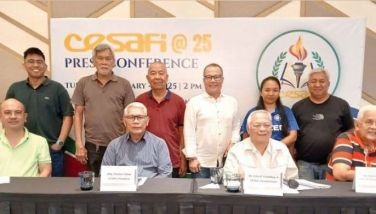Commentary: Righting the course for Philippines' COVID-19 resilience

In a recent interview, Department of Health Secretary Francisco Duque III said he was "pissed" at a recent Bloomberg study that ranked the Philippines 52nd among 53 economies in terms of COVID-19 resilience.
However, the ones that should really be pissed by the country's poor pandemic resilience are the over 9 million Filipinos that remain unemployed or underemployed during the prolonged lockdown or the thousands more that are infected by COVID-19 each day due to the government's inefficient vaccination, testing and tracing efforts.
According to Bloomberg's COVID Resilience Ranking, the Philippines' score of 45.3 was the second to the last on the index, ahead only of Argentina's 37. The indicators used to compute the ranking include: people covered by vaccines; lockdown severity; one-month cases per 100,000; total deaths per million; positive test rate; 2021 GDP growth forecast; universal healthcare coverage; and human development index.
Given these indicators, the Philippines' low ranking should come as no surprise. After all, we have been under a constant state of lockdown for over a year, we are in the longest recession since the Marcos era, only 2.38% of the population has been fully vaccinated, and we recently saw an uptick in the number of new cases logged each day.
Diwa Guinigundo, former deputy governor of the Bangko Sentral ng Pilipinas (BSP), furthermore warned that "while early green shoots have emerged, the country's recovery remains fragile." Warning further that as downside risks continue to exist in the form of a renewed spike in local transmission due to the new variant and the possible reimposition of lockdowns.
Speaking at a virtual event organized by the Stratbase ADR Institute with the country's top business leaders, Guinigundo underscored that economic recovery post-pandemic requires a well-coordinated mix of policy responses, specifically new and fresh approaches. In addition, he also emphasized how the private sector could capitalize and play a major role in rebuilding our economy.
Indeed, the private sector has demonstrated its willingness to partner and explore new approaches for economic recovery. However, further policy reforms could further unlock the private sector's potential to address the larger challenge of improving the country's COVID-19 resilience.
At the same virtual event, Calixto Chikiamco, the president of the Foundation for Economic Freedom (FEF), stressed the need to promote labor-intensive industrialization to generate employment. However, Chikiamco argued that the Philippines is not doing this because of high legal minimum wages and inflexible labor laws on the security of tenure. Hence, investors flock to Vietnam and Bangladesh instead.
Rizalina Mantaring, from the Management Association of the Philippines (MAP), also pointed to the Philippines' restrictive policy environment is scaring away both jobs and investments, citing the lack of foreign direct investments (FDIs) as evidence. "We need investments from anywhere we can get them," she said.
Another initiative that could drive economic growth is continued infrastructure development.
According to Cosette Canilao, the president and CEO of Aboitiz InfraCapital, infrastructure development—specifically through public-private partnerships (PPPs)—can stimulate the economy and accelerate revival by enabling businesses, generating jobs, empowering people, and creating opportunities for communities to grow.
For his part, Edgardo Lacson, the chairman of the Employers Confederation of the Philippines (ECOP), highlighted the importance of an efficient vaccine rollout program in economic recovery. "The vaccine rollout program must be accelerated to inoculate 77 million Filipinos or 70% of the population to achieve herd immunity”, a precondition to the full opening of the economy, he said.
Christian Gonzalez, executive vice president, International Container Terminal Services Inc. (ICTSI), also stressed the urgency to achieve herd immunity to stimulate the economy. However, Gonzalez said, "When we look at herd immunity, we need to look at it not on a broader national level, but in different regions."
"You have a number of cities in NCR. If they continue the way they are going now and add private vaccine centers, these cities in NCR can hit herd immunity in September or October," Gonzalez said.
Another COVID-19 resilience indicator that must be addressed is the human development index, a key element of which, according to the Bloomberg report, is ensuring access to education.
However, lawyer Joseph Noel Estrada, the managing director of the Coordinating Council of Private Educational Associations (COCOPEA), points out that 900 schools closed in the last school year alone and that 900 thousand basic education students failed to enroll, leading to a decline in enrolment as high as 50% for many private schools.
Estrada said these challenges are further exacerbated by a new policy that raises the income tax rate of proprietary education institutions by 150%. This policy puts the survival of these institutions at further risk of closing, thereby reducing the much needed access to education.
"This looming problem, particularly on the learning crisis, calls for the protective power of the State over the right of all citizens to quality and accessible education at all levels. Education indeed should not only continue, for us quality education must thrive," Estrada said.
Almost a year and a half into the pandemic, the Philippines remains among the worst places to be in the COVID-19 era. If the country is ever to leave the pandemic behind, the government must reassess its approach to ensure a well-coordinated mix of policy responses to improve COVID-19 resilience.
Policy reforms that attract foreign investment and maximize public-private partnerships should be prioritized to create jobs and revive the economy. Vaccination should also be ramped up through the complimenting efforts of national and local governments and the private sector to reach herd immunity and bring us closer to reopening.
The country must also not overlook its human development index since this dramatically impacts Filipino’s quality of life.
The country's poor performance in Bloomberg's COVID-19 resilience index highlights that the current policy and response direction are ineffective, at the same time, It also emphasizes the importance of new strategies and well-coordinated policies to righting the course.
Paco Pangalangan is the executive director of think tank Stratbase ADR Institute.
- Latest

























